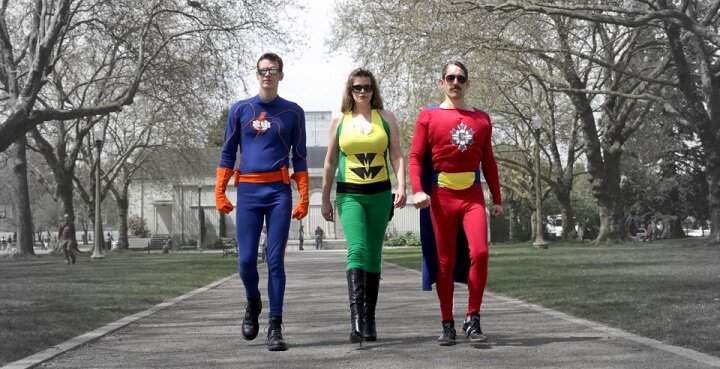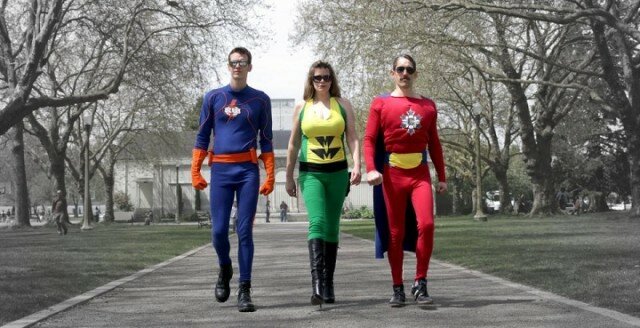The lives of heroes in the pages of comic books are not driven by complex characters or ideals; they’re driven by the bottom line. This observation lies at the heart of Team of Heroes: Behind Closed Doors, currently playing at the Annex Theatre through May 19 (Thursdays through Saturdays; tickets: $5-$15, Thursdays pay what you can). The play covers well-trod ground of revisionist takes on comic book heroes while remaining original, affectionate, and true to the source genre.
This second of a trilogy of plays by Alexander Harris concerns a group of super heroes operating as a for-profit company under the ruthless management of their executive (Angela DiMarco as Melody Knox). This isn’t a spoof of comic books or much of a commentary on them (beyond the corporate critique). It is neither more nor less than a highly successful dramatic adaptation of the form by way of an original plot—original in comic book terms at any rate.
What this production lacks in depth it makes up for in honesty, and a lack of depth is no criticism. Delving much beneath the surface would be out of step in this production that painstakingly honors its source genre in reproducing it on the stage.
Sure, big budget Hollywood pictures can explicitly enact a reader’s fantasy, eliding the panels of broken action into fluid spectacle, but this removes a key joy of comic books. The work that readers do to connect those panels is as much a part of the attraction of comic books as the easy language, vivid images, exciting plots, and sheer escapism of them. Audiences have a need to participate. That work keeps us wrapped up in mystery novels, it seduces us at food movies, it makes rabid fans out of readers.
Special effects aren’t theatre’s strong point (I’m looking at you, Spiderman: Turn Off The Dark). Theatre’s strength is that it’s real and immediate. Drawing attention to these qualities delights and thrills audiences. The Team of Heroes production team gets this and, by and large, doesn’t try for big effects—though when it does it succeeds with simplicity. Shadows, puppetry, and clever staging expand the scale of this show. Most of these effects are rough and self-conscious, as is the show as a whole, and this roughness helps create the pleasurable intimacy of reading.
By rough I don’t mean to suggest that it’s under-rehearsed. Team of Heroes isn’t distanced by the slick production values one sees at Seattle Rep or ACT. Nonetheless this is a really well produced show with some of the best scene transitions of any production I’ve seen. Even when set changes go on too long it’s obvious that the crew and actors are working as a tightly oiled machine. Some of these transitions are covered by video segments styled as interviews with the main characters. To the show’s credit these are not gratuitous curtains of action but specifically support the plot. Still one wishes there were more similar segments covering other scene changes.
There are a few less-than-necessary segments of nostalgia and self-effacing in-jokes. Some of the running send-up of Apple is kind of brilliant, but other pop cultural references feel disconnected.
Costumes are as honest as anything else in the show. They neither hide nor augment and simply let the actors be real people. Overall the art direction is spectacular. Every element of this show is of a piece, from the program to the mis-aligned one-point perspective. There are even a few stunning bits including the set for the scene at Mount Rushmore, that are simple, clever, and elegant.
The plot hinges on a pair of far-fetched turns that strain credulity while reengaging Team of Heroes with the comic book genre. The story leaps back and forth in time (Captain Exposition is thankfully absent from the team), which results in a lot of short, choppy scenes. As with many other seeming flaws the play gets away with this because it reinforces the paneled experience of the comic book. We just need to get those set changes either less visible or more interesting.
Those time leaps also create challenges for Tracy Leigh and Jason Sharp who alternate between playing teenagers and aging superheroes. Sharp handles the transition cannily, affecting his adult voice more than the teen voice. Leigh plays her adult character without affectation and her teenage characters suffers for it. Otherwise acting is pretty consistently sufficient.
Ryan Higgins and Sam Hagen have more fun than really ought to be allowed in a variety of bit roles. Angela DiMarco has a huge challenge in a role that is pivotal but thinly written (even for comic books). Unfortunately she does little to relieve the monotony of her one-note character. The rest of the roles are finely balanced with a mix of strengths and weaknesses that the actors manage to keep appealing throughout.
Yes, the audience Saturday night was heavily populated with young people in costumes having rather serious conversations about super hero match-ups and super power comparisons, but this is not a show for only the ComiCon crowd. It’s big, stupid fun done smartly and with tremendous intimacy. Anyone who loves theatre should see this show. Anyone who makes theatre should go learn something from it.

